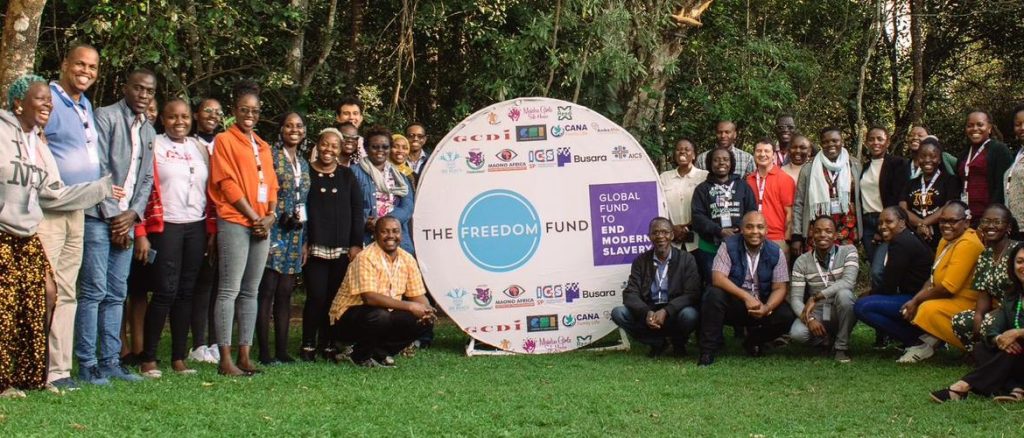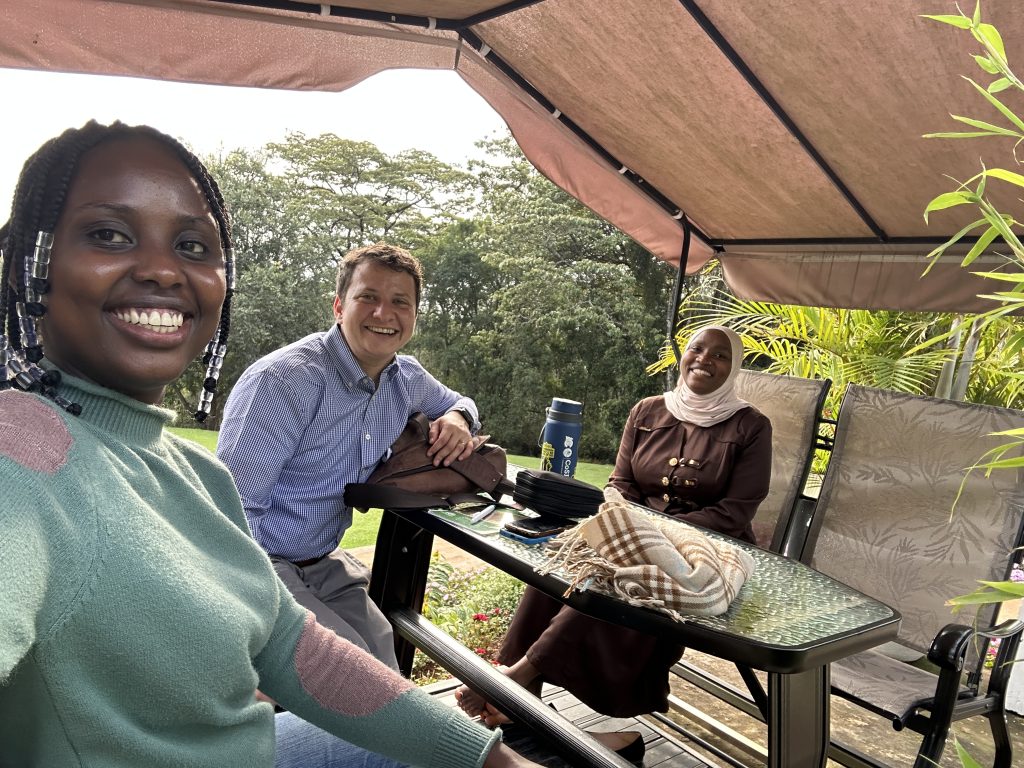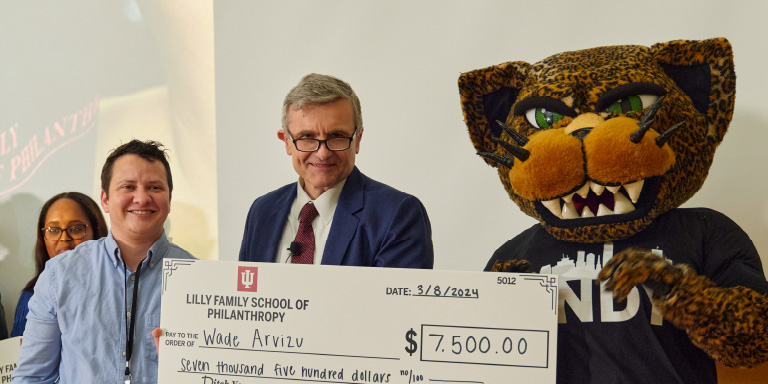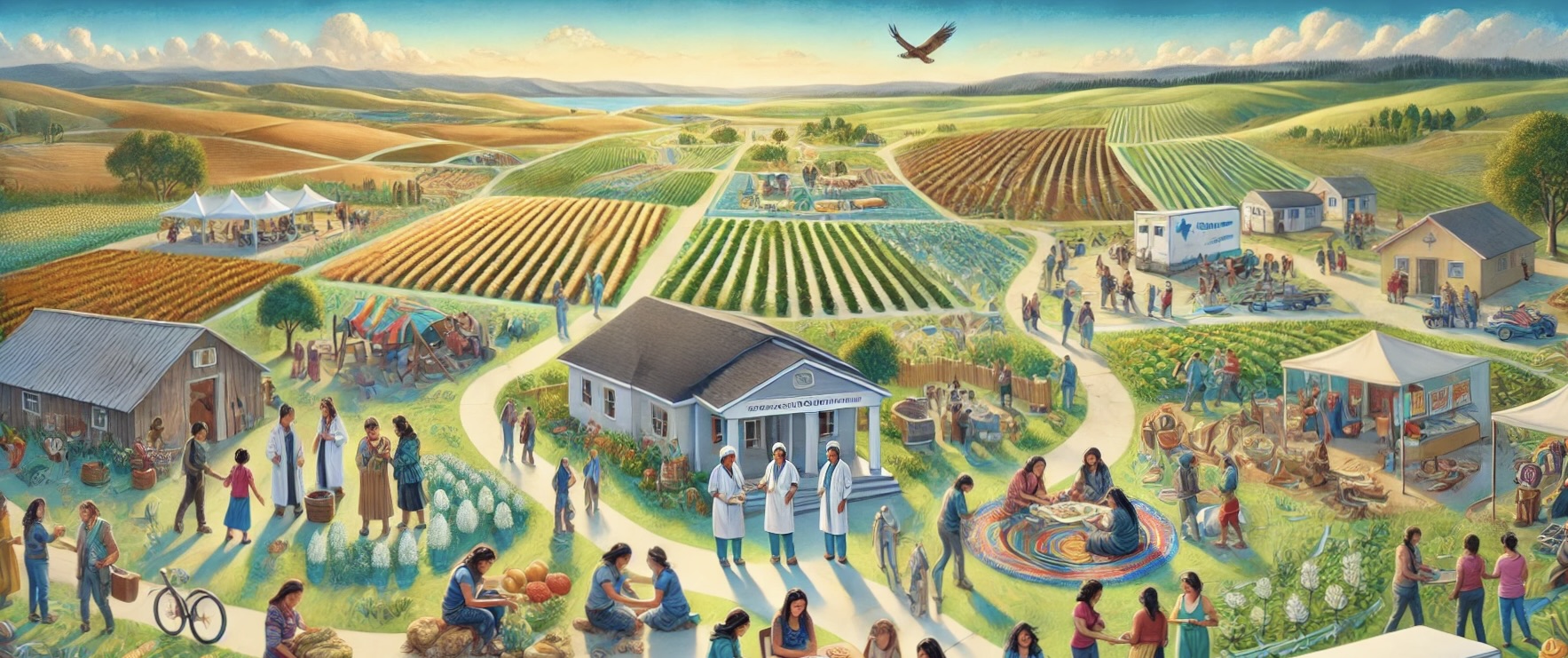Overview:
- A Farewell to GFEMS
- Enrolling at the Lilly Family School of Philanthropy at Indiana University
- Human Trafficking Fellowship Program Award Announcement
- Resources and Reports
- Funding Announcements

A Farewell to the Global Fund to End Modern Slavery
After sixteen months of working as the Associate Director of Community Engagement at the Global Fund to End Modern Slavery (GFEMS), I learned that the organization would be closing its doors by the end of the year. You can read a brief statement about their decision to shut down operations here. In addition to the reasons mentioned in GFEMS’ brief, it would be remiss not to highlight the funding disparity for human rights in the Global South and the East. The philanthropic space has seen an overall reduction of funding for human rights defenders, particularly initiatives led by local leadership (something I intend to address further in future publications).
My short time at GFEMS taught me so much as I traveled and worked with grassroots leaders and activists around the world, as well as different international governments and funders who had expressed commitments to address labor exploitation and human trafficking. We talked about challenges experienced in accessing funding and in meeting funder’s demands (which did not always align with their values and missions or make sense in the context of their work and culture).
While the work itself was a great experience, I will most cherish and value the relationships built along the way. Kenya will forever have a special place in my heart, and I remain connected through the lifelong friendships I have made and my role as the board chair of Azadi.

Enrolling at Indiana University’s Lilly Family School of Philanthropy
After years of dreaming about going back to university, I was accepted into the Lilly Family School of Philanthropy at Indiana University in Indianapolis.
I was invited to participate in a Pitch Your Passion scholarship competition, where I was awarded a renewable scholarship toward a degree in Philanthropic Leadership. I am incredibly grateful for the opportunity to go back to school without having to worry about accruing debt.

Pictured: Wade Arvizu with Dean Amir Pasic and the IU Indianapolis mascot, holding a commemorative check for an annual $7,500 scholarship.
I started my coursework last August, and it has been an incredible experience so far. This next semester I will be participating in a study away program at the Patterson Foundation, working to help local organizations create and execute strong fundraising programs.
Human Trafficking Fellowship Program Award Announcement

The Award
I am excited to share that in October 2024, I received the OVC FY24 Human Trafficking Fellowship Program Award for my project: Identifying and Promoting Culturally Responsive Service Models and Activities in the Anti-Trafficking Field.
This award, funded by the Office for Victims of Crime (OVC) will support a three-year fellowship highlighting how service providers and communities can better support human trafficking survivors. The project will have a specific focus on strengthening responses to labor trafficking, expanding access to support for male victims, and promoting a survivor’s right to choose their own path to recovery.
Context and Background
Despite the common association of human trafficking victims with primarily women and girls, the UNODC’s 2022 report noted a fivefold increase in identified male victims between 2004 and 2020, with boys and men making up 40% of all victims. Even with this knowledge, very few organizations focus on serving male trafficking victims. In 2018, the Human Trafficking Institute found that only 1 of 119 U.S. federally funded organizations for trafficking had a program specifically for male victims.
Additionally, over the last twenty years, anti-trafficking efforts have largely focused on sex trafficking, leaving labor trafficking largely unaddressed. In 2022, according to the 2023 Trafficking in Person’s Report, the Department of Justice reported 613 investigations that involved predominantly sex trafficking, but only 55 that involved predominantly labor trafficking.
Partnering with service organizations that successfully center cultural values and practices to identify and serve victims of human trafficking can help the field in its commitment to expanding access to services and justice for victims of labor trafficking.
Process
Over the three-year fellowship, I will travel to meet with subject matter experts, community leaders, service providers, and survivors across various fields and sectors to gain insight into their experiences and understand the unique needs of communities affected by human trafficking in different contexts.
The project will examine successful programs and initiatives to identify ways resources can more effectively meet the needs of survivors and strengthen efforts to combat human trafficking. At the conclusion of the project, I will deliver a detailed analysis of how these models impact existing victim services, with a particular focus on their implications for OVC policies and programs.
Next Month
- Rethinking Philanthropy: Accessible Grantmaking
- Curated for the Curious: Resource Recommendations
Resources and Reports
Human Trafficking
The 2024 Trafficking in Persons Report (Global)
Abstract
The State Department’s annual Trafficking in Persons Report provides the world’s most comprehensive assessment of human trafficking, as well as efforts by governments and stakeholders around the globe to combat it. By measuring progress in 188 countries – including the United States – we are advancing the commitment to prevent trafficking and protect survivors
U.S. Advisory Council on Human Trafficking 2024 Annual Report (USA)
About the Advisory Council
The United States Advisory Council on Human Trafficking (Council) comprises 13 survivor leaders who bring their expertise and experience to advise and provide recommendations to the President’s Interagency Task Force to Monitor and Combat Trafficking in Persons (PITF) to improve federal anti-trafficking policies.
The Council was established on May 29, 2015, in Section 115 of the Justice for Victims of Trafficking Act of 2015, Pub. L. 114-22, also known as the Survivors of Human Trafficking Empowerment Act.
2025 Human Trafficking Prevention Month Toolkit (USA)
Abstract
This toolkit is designed to educate and equip individuals and organizations with the tools they need to share resources, raise awareness, and foster meaningful connections to prevent human trafficking. It is structured around four key focus weeks to ensure clear messaging and effective resource-sharing. Throughout the month of January, we encourage you to engage with the provided resources to amplify your impact and help prevent trafficking.
Philanthropy
Expanding Our Understanding of Evidence for Meaningful Participation (Global)
Abstract
This report aims to expand our understanding of evidence in two key ways. First, it explores and consolidates existing evidence that demonstrates the effectiveness of participatory approaches in contributing to social change efforts and transforming philanthropic practices. Second, it proposes a new tool for evaluating the quality of evidence in a more inclusive manner.
The Giving Environment: Giving during times of uncertainty (USA)
Abstract
The pandemic and its aftermath have reshaped numerous facets of our everyday lives, including our philanthropic motivations and behaviors. To gain deeper insights into these giving trends, we analyzed longitudinal data from the Philanthropy Panel Study (PPS), a biannual survey of household giving behaviors, comparing pre-pandemic periods to the pivotal first year (2020) of the COVID-19 pandemic in the United States. The report quantifies shifts in overall giving rates and average giving amounts while also identifying key drivers of altered giving behavior. Although some findings explore well-researched aspects of giving, this report also uncovers how pandemic factors—such as social distancing mandates, economic loss, and COVID-19 related morbidity/mortality—impacted giving patterns. These findings contribute to an emerging body of research that explores how donors respond during times of crisis and uncertainty.
Women Give 2024: 20 Years of Gender & Giving Trends (USA)
Abstract
Charitable giving in the U.S. has seen significant changes in recent years, influenced by evolving social norms and external crises. Women Give 2024: 20 Years of Gender and Giving Trends explores how giving by women and men in the U.S. has changed since the turn of the century. This report offers a nuanced understanding of how gender has shaped charitable giving over the last two decades. How has giving by women and men changed over the last 20 years, especially in response to COVID-19?
Dollars and Change: A Look at Individual and Institutional Giving in the U.S. from 2015-2022 (USA)
Abstract
This report combines data from GivingTuesday, Candid, and Network for Good to create a comprehensive view of capital flows in the nonprofit sector. This collaborative research project aimed to explore two primary questions: 1) Can cross-organizational data sets be combined strategically? 2) By combining cross-organizational data sets, what can we learn about how capital flows in the nonprofit sector? To answer these questions, the team used an exploratory research approach, beginning with broad inquiries and letting the data guide our analysis. Answers to questions about how capital flows in the sector are grouped into three high-level topics: giving by cause area and size; giving by recipient location; and giving and the economy. Additionally, our discoveries related to combining these data sets are summarized in the Lessons learned section of the report. We close the report by sharing our ideas for future research and collaboration.
Human rights funding pivots in crisis: Tradeoffs, gaps, and lessons learned (Global)
Funding Announcements
Government Funding
DRL FY24 Global Equality Fund Programs: LGBTQI+ (Global) Grants Deadline 3/14/2025
Improving Adult and Youth Crisis Stabilization and Community
Reentry Program | BJA
Grants.gov deadline: 2/24/2025 | JustGrants deadline: 3/3/2025
Second Chance Act Addressing the Needs of Incarcerated Parents and Their Minor Children | OJJDP
Grants.gov deadline: 2/6/2025
U.S. Department of Justice Coordinated Tribal Assistance
Solicitation | DOJ
Grants.gov deadline: 3/18/2025
Foundation Grants (USA)
Bob Barker Foundation invites LOIs from organizations working to reduce recidivism (United States)
Deadline: Rolling (Letters of Inquiry)
Lilly Endowment invites applications for phase 2 of Marion County K-12 Public Schools Initiative (Marion County, Indiana, USA)
Deadline: February 14, 2025.
Deadline: January 31, 2025
Chamiza Foundation invites applications for Pueblo Indian culture preservation
Deadline: February 7, 2025
American Psychiatric Association Foundation invites applications for minority mental health programs (USA)
Deadline: January 31, 2025
American Psychological Foundation invites applications to help alleviate trauma (USA)
Deadline: February 21, 2025